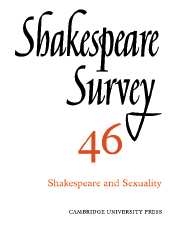Book contents
- Frontmatter
- Shakespeare and Sexuality
- As Who Liked It?
- Malvolio and the Eunuchs: Texts and Revels in Twelfth Night
- The Scandal of Shakespeare’s Sonnets
- Weaving and Writing in Othello
- ‘That’s She that was Myself’: Not-so-Famous Last Words and Some Ends of Othello
- ‘The Catastrophe is a Nuptial’: The Space of Masculine Desire in Othello, Cymbeline, and The Winter’s Tale
- Reconstructing The Winter’s Tale
- Late Shakespeare: Style and the Sexes
- The Virgin Not: Language and Sexuality in Shakespeare
- Fleshing his Will in the Spoil of her Honour: Desire, Misogyny, and the Perils of Chivalry
- Bowdler and Britannia: Shakespeare and the National Libido
- Shakespeare and the Ten Modes of Scepticism
- Shakespeare Performances in England, 1992
- Professional Shakespeare Productions in the British Isles, January-December 1991
- 1 Critical Studies
- 2 Shakespeare’s Life, Times, and Stage
- 3 Editions and Textual Studies
- Books Received
- Index
As Who Liked It?
Published online by Cambridge University Press: 28 March 2007
- Frontmatter
- Shakespeare and Sexuality
- As Who Liked It?
- Malvolio and the Eunuchs: Texts and Revels in Twelfth Night
- The Scandal of Shakespeare’s Sonnets
- Weaving and Writing in Othello
- ‘That’s She that was Myself’: Not-so-Famous Last Words and Some Ends of Othello
- ‘The Catastrophe is a Nuptial’: The Space of Masculine Desire in Othello, Cymbeline, and The Winter’s Tale
- Reconstructing The Winter’s Tale
- Late Shakespeare: Style and the Sexes
- The Virgin Not: Language and Sexuality in Shakespeare
- Fleshing his Will in the Spoil of her Honour: Desire, Misogyny, and the Perils of Chivalry
- Bowdler and Britannia: Shakespeare and the National Libido
- Shakespeare and the Ten Modes of Scepticism
- Shakespeare Performances in England, 1992
- Professional Shakespeare Productions in the British Isles, January-December 1991
- 1 Critical Studies
- 2 Shakespeare’s Life, Times, and Stage
- 3 Editions and Textual Studies
- Books Received
- Index
Summary
Bernard Shaw wrote on 4 October 1897 that the Shakespearian producer Augustin Daly ‘was in full force at the Islington Theatre on Monday evening last with his version of “As You Like It” just as I don’t like it’. Surprisingly, the reaction of many people in the late twentieth century to this most actable of plays is often one of disappointment. The actress Juliet Stevenson, who played Rosalind in 1985, complained of productions which offered ‘“a rural romp in an Arden full of polystyrene logs”’ and protests: ‘I’d always suspected that there’s a much more dangerous play in As You Like It.’ The 1990 Cheek by Jowl all-male production was greeted ecstatically by both male actors and male critics: Adrian Lester’s Rosalind was voted ‘sexy’ and exciting. Men liked it. But what about women? If a woman’s voice was raised in the critical debate, I missed it. In the past, of course, there would have been no such voice, except from the reminiscences of a few celebrated actresses. How different our theatrical records might have been had Elizabeth Pepys scribbled in the margin next to her husband’s account of A Midsummer Night’s Dream as the most ridiculous and insipid play he ever saw in his life: ‘Sam didn’t like it but I thought it was great, very sexy.’
What did the numerous women in Shakespeare's audience like? The Elizabethans considered theatre-going to be unavoidably erotic, and in anti-theatrical literature it was feared the boy actor would arouse homoerotic fantasies. But what, in that case, would the fantasy life of the women in the audience look like?
- Type
- Chapter
- Information
- Shakespeare Survey , pp. 9 - 22Publisher: Cambridge University PressPrint publication year: 1993

